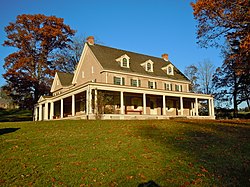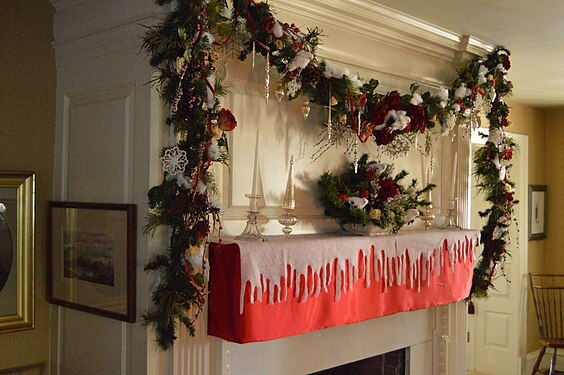
Montgomery County, colloquially referred to as Montco, is a county in the Commonwealth of Pennsylvania. As of the 2020 census, the population of the county was 856,553, making it the third-most populous county in Pennsylvania after Philadelphia and Allegheny counties, also the most populous county in Pennsylvania without a major city. The county is part of the Southeast Pennsylvania region of the state.
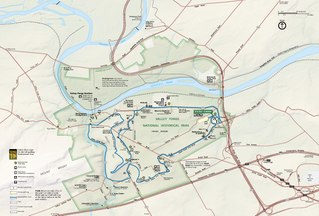
Audubon is a census-designated place (CDP) in Lower Providence Township, Montgomery County, Pennsylvania, United States. It was named for naturalist John James Audubon, who lived there as a young man. The population was 8,433 at the 2010 census.
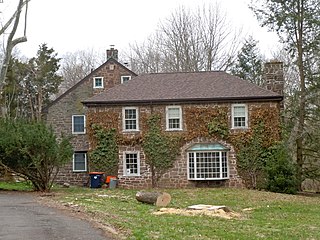
Collegeville is a borough in Montgomery County, Pennsylvania, a suburb outside of Philadelphia on Perkiomen Creek. Collegeville was incorporated in 1896. It is the location of Ursinus College, which opened in 1869. The population was 5,089 at the 2010 census.

Lower Frederick Township is a township in Montgomery County, Pennsylvania, United States. The population was 4,840 at the 2010 census.

Perkiomen Township is a township in Montgomery County, Pennsylvania, United States. As of the 2010 census, the township population was 9,139, which represents a 28.8% increase from the 2000 total of 7,093 residents. Governmentally, it is a township of the second class, governed by a board of supervisors. It is part of the Perkiomen Valley School District. Perkiomen Township includes an abundance of history that goes as far back as to the first tribes who inhabited the area. This township started with the inhabitants of the Lenni-Lenape Tribe and progressed in many ways into what it is today.
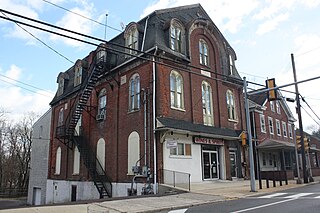
Schwenksville is a borough in Montgomery County, Pennsylvania, United States. The population was 1,431 at the 2020 census. It is notable for being located near the site of the Philadelphia Folk Festival. The borough was founded in 1684, when the Lenni-Lenape Indians ceded to William Penn the land along the Perkiomen Creek; it was incorporated in 1903. The borough was named for George Schwenk, whose son, Jacob Schwenk, served in George Washington's army.

Skippack Township is a township in Montgomery County, Pennsylvania, United States. The population was 14,408 in 2022 according to the Census Bureau. This represents a 5.1% increase from the 2010 Census.

Samuel Whitaker Pennypacker was an American politician and the 23rd governor of Pennsylvania, serving from 1903 to 1907. A judge assigned to Pennsylvania's Court of Common Pleas system prior to his election as governor, he also researched and wrote about Pennsylvania history.

Hope Lodge is a historic building located at 553 South Bethlehem Pike in Fort Washington, Pennsylvania, in the United States. This mansion has been described as "one of the finest examples of Georgian Colonial architecture in this part of the country. It was used by Continental troops during the 1777 Philadelphia Campaign during the American Revolution.

The Perkiomen Trail is a 19-mile-long (31 km) multi-use rail trail along the Perkiomen Creek in Pennsylvania.
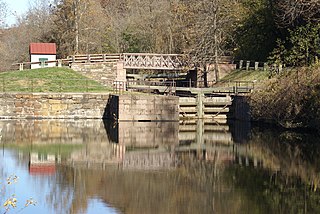
Mont Clare is a village in Upper Providence Township, Montgomery County, Pennsylvania. The village is located on the left bank of the Schuylkill River opposite Phoenixville and Chester County. Mont Clare is at the site of the former Jacobs' ford. Mont Clare hosts the only functional lock and one of only two remaining watered stretches of the Schuylkill Canal. Mont Clare was the birthplace of the infamous outlaw Sundance Kid. As of the 2020 United States census the population was 1,852.

Farmar Mill, also known as Mathers Mill, is a historic mill building. The mill was powered by the Wissahickon Creek and is located on Mather's Lane near Skippack Pike, and just west of the historic Bethlehem Pike in the village of Whitemarsh, Pennsylvania, in the United States.

Graeme Park is an historic site and National Historic Landmark at 859 County Line Road in Horsham, Pennsylvania, United States. It is owned by the Pennsylvania Historical and Museum Commission and operated by the non-profit group, The Friends of Graeme Park. It is the only surviving residence of a colonial-era Pennsylvania governor.
The Perkiomen Valley School District (PVSD) is a school district based in central Montgomery County, Pennsylvania, United States. It serves the boroughs of Collegeville, Trappe, and Schwenksville, and the townships of Lower Frederick, Perkiomen, and Skippack, in Pennsylvania. The district headquarters are in Perkiomen Township.

Mill Grove is a historic house and estate on Pawlings Road in Audubon, Pennsylvania. Built in the 1760s, it is notable as the first home in America of painter and naturalist John James Audubon (1785-1851), for whom the community is named. The 130-acre (53 ha) estate is now maintained as a museum and wildlife sanctuary by Montgomery County, and was designated a National Historic Landmark in 1989. The house serves as the educational center of the Pennsylvania chapter of the National Audubon Society, and is known as John James Audubon Center at Mill Grove.
Zieglerville is an unincorporated community in Lower Frederick Township in Montgomery County, Pennsylvania, United States. Its ZIP Code is 19492 and it is located on the west side of the Perkiomen Creek where PA Route 29 and PA Route 73 split at a roundabout, just north of Schwenksville.
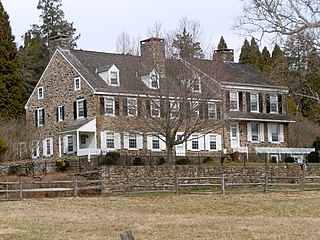
The Warwick Furnace Farms is a historic district that is located in northern Chester County, Pennsylvania, United States that includes the ruins of an early iron furnace that was owned by Anna Rutter Nutt, widow of Samuel Nutt.

The Perkiomen Bridge, originally built 1798-99 and widened in 1928, is one of the oldest stone arch bridges in the United States still in use. It crosses Perkiomen Creek near Collegeville, Pennsylvania. The bridge's six semi-circular arches cover a total of over 300 feet (91 m). The longest arch spans 76 feet (23 m). Its decorative piers and belt courses are unusual for a bridge this old. A lottery financed $20,000 of the original construction. The bridge carried the main road from Philadelphia to Reading, known at various times as the Manatawny Pike, Germantown Pike, the Philadelphia-Reading Pike, and US 422. Since the construction of the US 422 bypass, the road has been known as Ridge Pike or Old US 422.
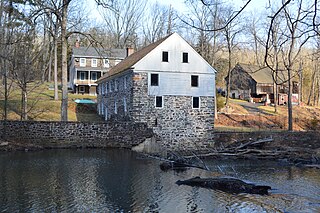
The Sunrise Mill is an historic grist mill complex that is located near Schwenksville in Upper Frederick Township, Montgomery County, Pennsylvania in the United States.

The Reading Furnace Historic District is a national historic district that is located in Warwick Township and East Nantmeal Township, Chester County, Pennsylvania.
